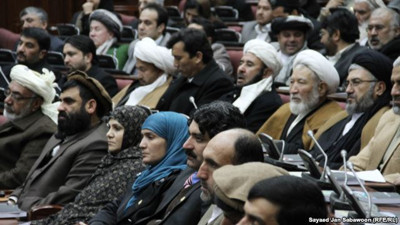By Talia Ralph
Afghanistan's parliament has blocked women's rights legislation approved by President Hamid Karzai in 2009, claiming that it is un-Islamic.
The Elimination of Violence Against Women Law, or EVAL, which requires parliamentary support to pass, aims to prevent violence against women, child marriages, and forced marriages.
However, religious-minded MPs have objected to at least eight of the legislation's articles, such as government-funded domestic abuse shelters, keeping the legal age of marriage at 16 for women, and capping the number of permitted wives at two instead of the current four.

Afghan parliament. (Photo: RFE/RL)
"Whatever is against Islamic law, we don’t even need to speak about it," said conservative lawmaker Khalil Ahmad Shaheedzada.
Many of the conservative MPs also accused Karzai of being anti-Islamic for signing the law in the first place, and demanded that men cannot be prosecuted for rape within marriage, as the legislation has outlined.
Speaker Abdul Rauf Ibrahimi said the 244-member assembly would look at the law again at a later date, but did not specify when.
"Today, the parliamentarians who oppose women's development, women's rights and the success of women...made their voices loud and clear," Fawzia Koofi, the head of parliament's women's commission, told Reuters.
Afghanistan continues to grapple with the Taliban-imposed Islamic law that keeps many women at home and devoid of many rights.
Though EVAL has technically been in place since it was signed by Karzai, its enforcement is spotty at best — between March 2010 and 2011, the first full year of the law's enactment, just 155 cases (7 percent of all cases) were prosecuted with criminal charges.



